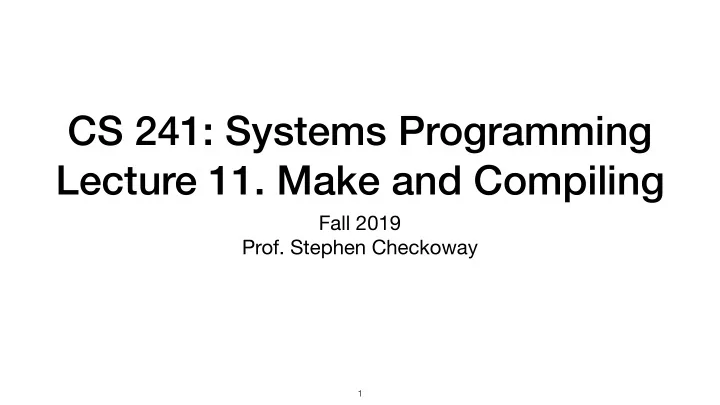

CS 241: Systems Programming Lecture 11. Make and Compiling Fall 2019 Prof. Stephen Checkoway � 1
https://xkcd.com/303/ � 2
Only compile what you need All at once ‣ $ clang -std=c11 -Wall -o program *.c One file at a time with separate linking step ‣ $ clang -std=c11 -Wall -c -o foo.o foo.c $ clang -std=c11 -Wall -c -o bar.o bar.c $ clang -std=c11 -Wall -c -o qux.o qux.c $ clang -o program foo.o bar.o qux.o � 3
One option: Make a script #!/bin/bash Are there any problems with this approach? changed =no if [[ ! -f foo.o || foo.c -nt foo.o ]]; then clang -std= c11 -Wall -c -o foo.o foo.c changed =yes fi if [[ ! -f bar.o || bar.c -nt bar.o ]]; then clang -std= c11 -Wall -c -o bar.o bar.c changed =yes fi if [[ ${changed} = yes ]]; then clang -o myprogram foo.o bar.o fi � 4
Potential problems Lots of very similar code (imagine many di ff erent files) Didn't mention header files! Need to recompile if any included header files change � 5
Enter Make A Makefile consists of a set of rules like myprogram: main.o foo.o bar.o clang -o myprogram main.o foo.o bar.o -lsomelibrary The target (myprogram) names the file to be created The prerequisites (main.o foo.o bar.o) name the files that are required to exist or be built before the target can be made The recipe (clang ...) specifies a sequence of shell commands to run ‣ Each line is its own command ‣ Each line must start with a literal tab character, spaces won't work � 6
Making things At the command line ‣ $ make target1 ... targetn ‣ $ make # makes the first target in the Makefile Make creates a list of the prerequisites of each target and their prerequisites and their prerequisites and… For each item in the list, make decides if it is up to date (newer than each of its prerequisites) or if it needs to run a recipe to remake it Make then runs the necessary rules to make all the targets � 7
Prerequisite example myprogram depends on foo.c foo.h main.c bar.h bar.c main.o , foo.o , and bar.o bar.o depends on bar.c and bar.h foo.o main.o bar.o foo.o depends on foo.c and foo.h myprogram main.o depends on main.c , foo.h and bar.h � 8
If foo.c changes, which files need to be remade? A. foo.o foo.c foo.h main.c bar.h bar.c B. foo.o and myprogram C. foo.o, main.o, and foo.o main.o bar.o myprogram D. foo.o, main.o, bar.o, and myprogram myprogram E. None � 9
If foo.h changes, which files need to be remade? A. foo.o foo.c foo.h main.c bar.h bar.c B. foo.o and myprogram C. foo.o, main.o, and foo.o main.o bar.o myprogram D. foo.o, main.o, bar.o, and myprogram myprogram E. None � 10
A complete Makefile myprogram: main.o foo.o bar.o clang -o myprogram main.o foo.o bar.o main.o: main.c foo.h bar.h clang -std=c11 -Wall -c -o main.o main.c foo.o: foo.c foo.h clang -std=c11 -Wall -c -o foo.o foo.c bar.o: bar.c bar.h clang -std=c11 -Wall -c -o bar.o bar.c � 11
DRY: Don't Repeat Yourself CC := clang CFLAGS := -std=c11 -Wall objs := main.o foo.o bar.o myprogram: $(objs) $(CC) -o myprogram $(objs) main.o: main.c foo.h bar.h $(CC) $(CFLAGS) -c -o main.o main.c foo.o: foo.c foo.h $(CC) $(CFLAGS) -c -o foo.o foo.c bar.o: bar.c bar.h $(CC) $(CFLAGS) -c -o bar.o bar.c � 12
Pattern rules and automatic vars Pattern rule ‣ target contains one % which matches any nonempty sequence of chars ‣ prerequisites can also (and usually do) contain % which match Automatic variables (the two most useful) ‣ $@ is set to the rule's target ‣ $< is set to the first prerequisite Example rule to compile .c files to .o files %.o: % .c $(CC) $(CFLAGS) -c -o $@ $< � 13
DRYer CC := clang But wait, we forgot something! CFLAGS := -std=c11 -Wall objs := main.o foo.o bar.o myprogram: $(objs) $(CC) -o $@ $(objs) %.o: % .c $(CC) $(CFLAGS) -c -o $@ $< main.o: foo.h bar.h foo.o: foo.h bar.o: bar.h � 14
Makefile: complete CC := clang CFLAGS := -std=c11 -Wall objs := main.o foo.o bar.o myprogram: $(objs) $(CC) -o $@ $(objs) %.o: % .c $(CC) $(CFLAGS) -c -o $@ $< main.o: foo.h bar.h foo.o: foo.h bar.o: bar.h � 15
Phony targets Phony targets don't correspond to actual files Phony targets' recipes always run if the target is specified (or is a prerequisite of a target to be built) Common phony targets ‣ all: Usually the first target, depends on the program(s) to be built ‣ clean: Removes all of the files built by make .PHONY: all clean all: myprogram clean: $(RM) myprogram $(objs) � 16
Generating Makefiles (opinion!) GNU Automake (together with GNU Autoconf) generate Makefiles ‣ Really great to use as a user, you run $ ./configure $ make $ make install ‣ Horrible for developers (need to know m4, autoconf, automake, make, sh) Cmake ‣ Horrible for users, a huge hassle for developers ‣ Can generate Makefiles, Ninja files (Ninja is great!), or IDE configurations Make Makefile (mkmf): The less said about it the better � 17
Generating dependencies makedepend ‣ Pretty simple to use to generate the dependencies ‣ Modifies the Makefile itself! ‣ Doesn't play nice with version control The compiler knows what files it needs to compile each source file, you can ask it to dump out the dependency information in Makefile format (usually .d files) and the include that information ‣ Complicated to get right ‣ Fantastic when it works ‣ http://make.mad-scientist.net/papers/advanced-auto-dependency- generation/#include � 18
In-class exercise https://checkoway.net/teaching/cs241/2019-fall/exercises/Lecture-11.html Grab a laptop and a partner and try to get as much of that done as you can! � 19
Recommend
More recommend